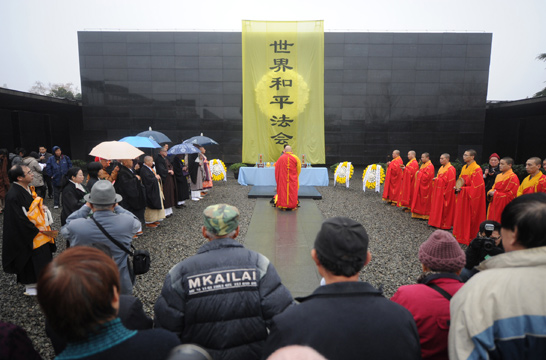Photos
China commemorates Nanjing Massacre victims
Updated: 2010-12-13 23:04
(Xinhua)
NANJING -- About 5,000 Chinese and foreigners gathered Monday in Nanjing, capital of east China's Jiangsu Province, to mourn hundreds of thousands of people who were killed by invading Japanese troops 73 years ago.
Participants in the ceremony stood in silent tribute, offered wreaths and bowed in front of the Memorial Hall of the Victims in the Nanjing Massacre, with sirens wailing in the drizzling morning on Monday, the 73rd anniversary of the massive slaughter.
"The Japanese soldiers invaded Nanjing when I was four, and they killed some of my family members. On the anniversary of the massacre every year I would come here to express my grief," said Sun Xuelan, a 77-year-old survivor, who is confined to a wheelchair.
Japanese troops occupied Nanjing on December 13, 1937 and began a six-week massacre. Records show more than 300,000 people -- not only disarmed soldiers , but also civilians -- were killed.
|
||||
He noted that the tragedy had become a symbol of the Chinese people's bitter suffering and prompted all people to learn the preciousness of peace."
"We should remember the history, but not hatred. Peace is a common desire of all human beings," said Nanjing citizen Yu Hong , who attended the ceremony.
Besides the memorial ceremony, Buddhist monks from China and Japan held a religious service Monday at the Memorial Hall of the Victims of the Nanjing Massacre.
The assembly was attended by 15 monks from six Buddhist temples in Japan, more than 50 monks and Buddhist believers from China and thirty Massacre survivors and relatives of victims.
The monks chanted Buddhist prayers of mourning and prayed for peace.
Aori Take Shuna, abbot of Japan's Reiunti Temple, read a poem he wrote to honor the dead and prayed for long-term friendship between the peoples of China and Japan.
Yamauchi Sayoko, who was a representative of a sect of Japanese Buddhism, said that the people of Japan, which invaded and occupied China in the 1930s and 1940s, were deeply regretful for the victims of the war and sincerely hoped such a tragedy would never be repeated.
Built in 1985, the memorial hall annually records five million visitors since it was expanded and renovated in 2007.
Zhu Chengshan, curator of the hall, said that every year when the anniversary of the Nanjing Massacre occurs , nearly 10,000 Nanjing citizens would swarm the hall and spontaneously mourn the victims.
On Sunday, workers began to extend a memorial wall at the memorial hall on which names of those killed are engraved.
After the extension, the wall would have 10,324 names, 1,724 more than three years ago, Zhu said.
Collecting the names of the victims was an important job in researching the Massacre, but it was difficult to find witnesses and documents decades later, he said.
Moreover, a group of historians from China, Japan and the United States has begun compiling an encyclopedia on the Nanjing Massacre, which was expected to embody a wide range of historical documents and pictures. "The dictionary may serve as a consolation to the deceased," Zhu said.
E-paper

Ear We Go
China and the world set to embrace the merciful, peaceful year of rabbit
Preview of the coming issue
Carrefour finds the going tough in China
Maid to Order
Specials

Mysteries written in blood
Historical records and Caucasian features of locals suggest link with Roman Empire.

Winning Charm
Coastal Yantai banks on little things that matter to grow

New rules to hit property market
The State Council launched a new round of measures to rein in property prices.





